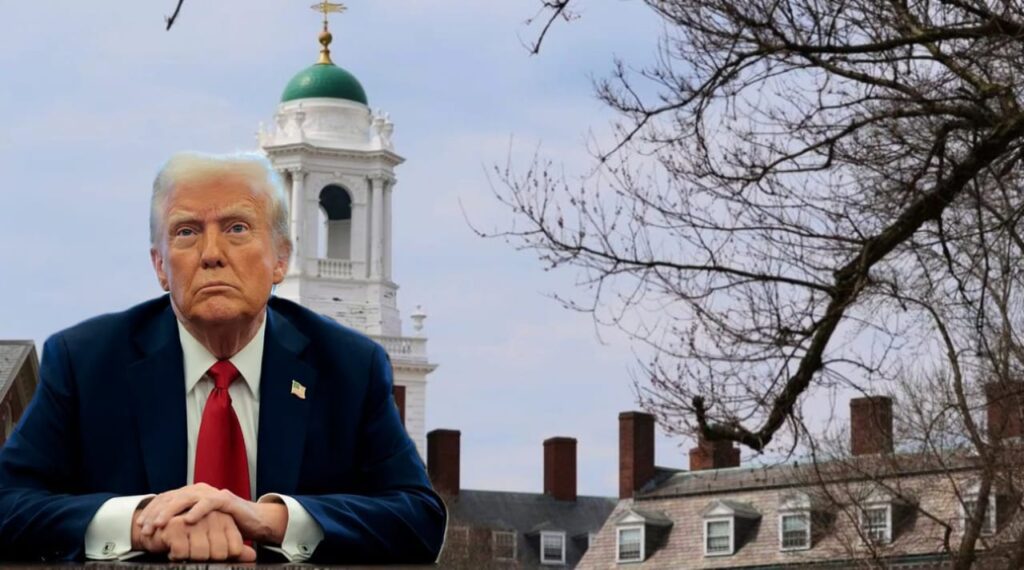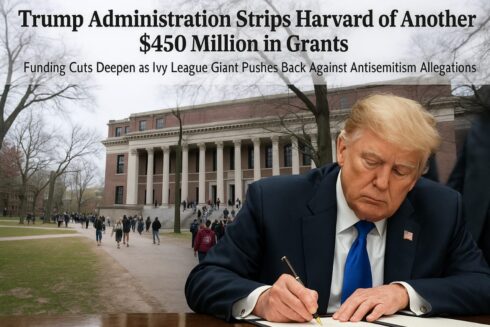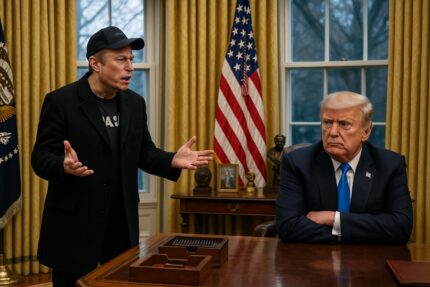The Trump administration has escalated its financial offensive against Harvard University, announcing on Tuesday that it will strip the Ivy League institution of an additional $450 million in federal research grants. This development comes just a day after Harvard publicly rebutted claims by the administration that it has become a bastion of leftist ideology and antisemitism.
A letter from a federal antisemitism task force confirmed that grants from eight different federal agencies would be terminated, adding to the $2.2 billion already frozen earlier this year. Signed by senior officials at the Departments of Education, Health and Human Services, and the General Services Administration, the letter accused Harvard of becoming a “breeding ground for virtue signaling and discrimination.” The letter claimed that the university has prioritized “appeasement over accountability,” and therefore forfeited its right to public funding.
Harvard officials have not yet issued a formal response to the latest funding cuts. However, the developments reflect deepening tensions between the Trump administration and elite academic institutions, particularly those perceived to challenge federal directives on cultural and political matters.
The Trump Administration’s Stated Reasons for the Cuts
According to the federal letter, Harvard’s inability to address campus antisemitism and its continued promotion of diversity, equity, and inclusion (DEI) initiatives contributed significantly to the funding reduction. The Trump administration argues that taxpayer dollars should not support what it characterizes as ideologically biased or discriminatory environments.
The Trump administration has increasingly targeted colleges it accuses of fostering a politically one-sided atmosphere, with Harvard singled out for allegedly failing to address antisemitism and for encouraging progressive activism. Citing the 2023 Supreme Court ruling that invalidated race-based admissions at Harvard, the letter describes a “steep, uphill battle” for the university to regain its former status as an institution committed to academic rigor and fairness.
Further pressure came in the form of a recommendation to revoke Harvard’s tax-exempt status and its eligibility to host international students—measures that, if enacted, could inflict long-lasting reputational and operational damage on the university.
White House Sanctions Target DEI and Pro-Palestinian Activism

The Trump administration’s sanctions against Harvard are part of a broader campaign targeting elite universities that have resisted federal demands to curb certain campus movements. Harvard was the first institution to openly defy federal instructions to suppress pro-Palestinian activism and dismantle DEI programs—actions which have put it squarely in the administration’s crosshairs.
President Trump has vowed to push for the revocation of Harvard’s tax-exempt status and has directed the Department of Homeland Security to review the school’s visa privileges for foreign students. These actions signal a sweeping federal intervention in higher education, with implications for academic freedom, institutional autonomy, and civil discourse.
The Department of Education has further stated that Harvard will receive no new grants until it complies with federal demands, including leadership changes, revisions to admissions policies, and a comprehensive audit to ensure ideological diversity on campus.
Harvard Fights Back in Court
In response to the sweeping funding cuts, Harvard has filed a lawsuit aiming to block the federal government’s actions. In a strongly worded letter released Monday, Harvard President Alan Garber contested the administration’s claims, stating that the university “remains nonpartisan and law-abiding” and has taken concrete steps to address antisemitism.
Garber described the sanctions as an “unlawful attempt to control fundamental aspects of our university’s operations,” arguing that the government has overstepped its authority. Harvard’s legal strategy is likely to hinge on constitutional protections surrounding academic freedom and the limits of executive power over independent institutions.
The Trump administration’s response has been equally forceful. Tuesday’s letter pointed to the Supreme Court’s affirmative action ruling and internal university reports documenting antisemitic incidents as evidence of systemic failure. Federal officials insist that Harvard’s actions are incompatible with its continued receipt of taxpayer money.
Students and Researchers Already Feeling the Impact
The effects of the funding cuts are already reverberating across Harvard’s campus, especially in research-intensive departments. Earlier this month, Harvard doctoral student Benjamin Daniels highlighted the real-world consequences of the lost grants. “I work on tuberculosis. I work on hepatitis,” Daniels told WBZ-TV. “We’ve had programs cut from tuberculosis vaccination, which was about to open a new trial, which affects almost one quarter of the global population.”
The loss of federal support jeopardizes critical scientific and public health research, with potential consequences reaching far beyond Cambridge. Harvard Medical School and affiliated hospitals have also begun scaling back projects reliant on federal funding, raising concerns among faculty and students alike.
As Harvard prepares for a protracted legal and political battle, many in academia are watching closely. The outcome of this confrontation could reshape the relationship between the federal government and American universities for years to come.














